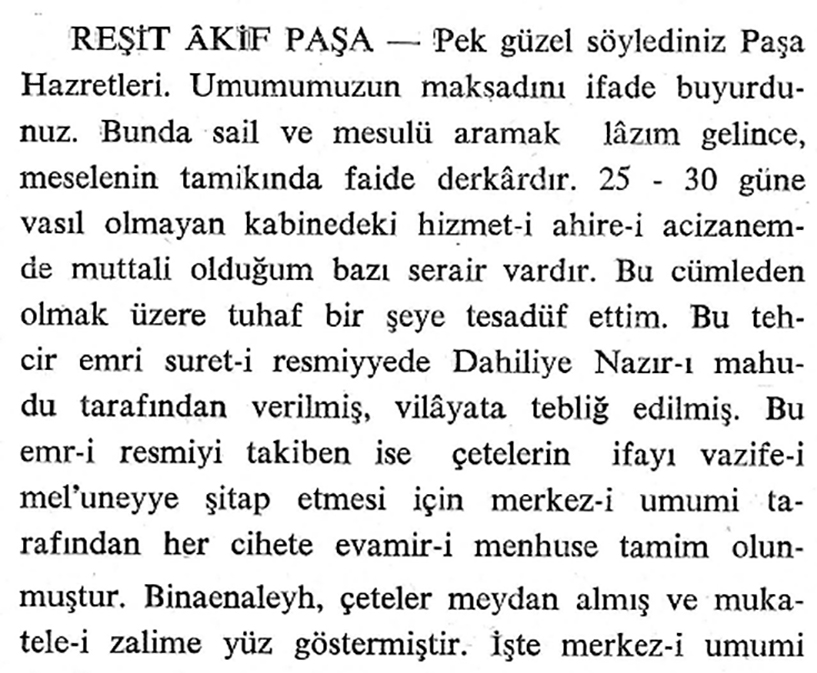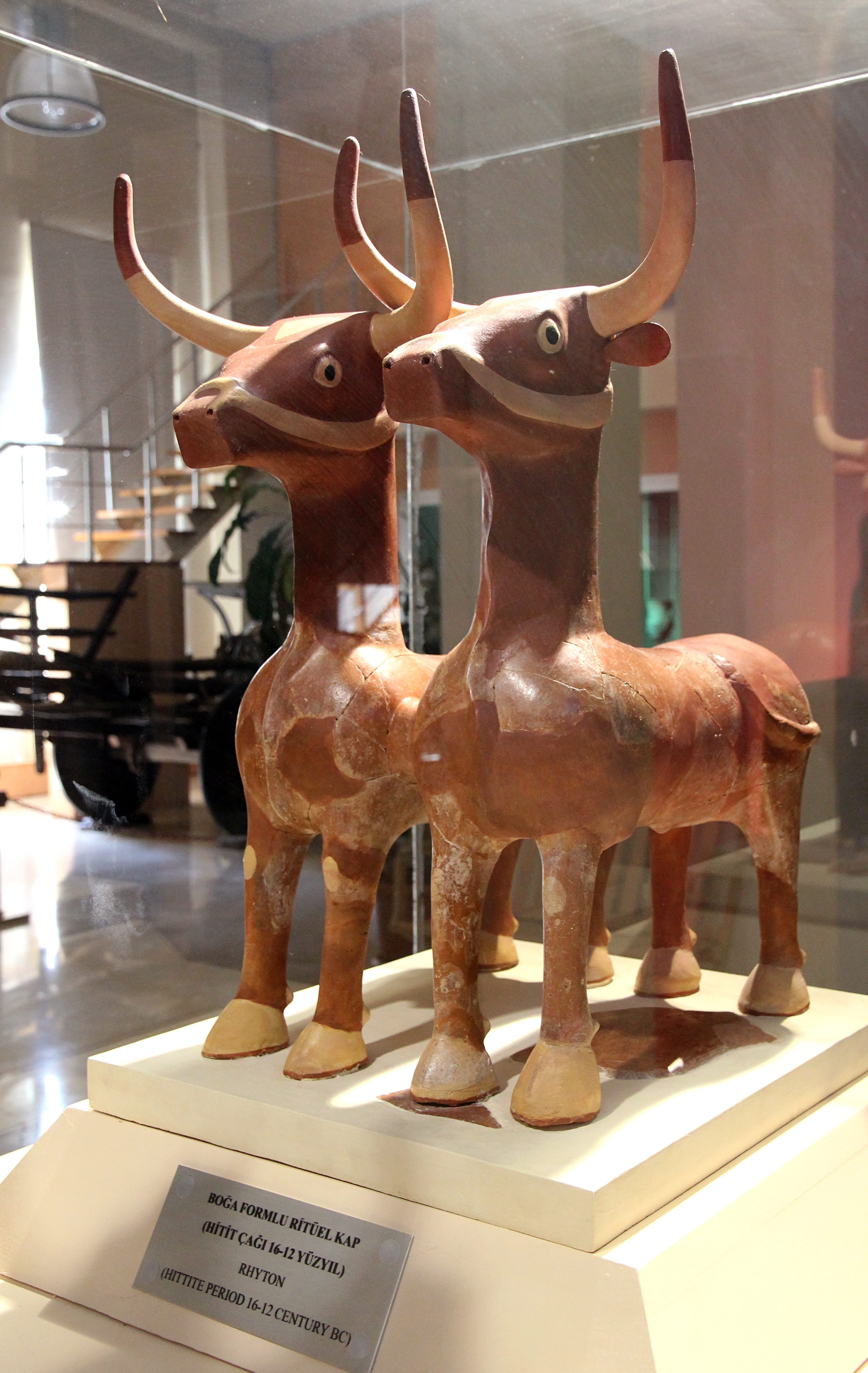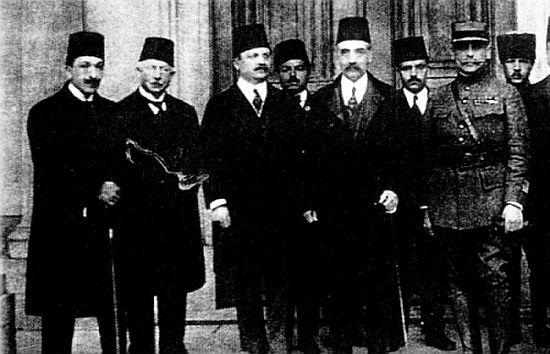|
Reshid Akif Pasha
Reshid Akif Pasha ( tr, Reşit Akif Paşa, sq, Reshid Aqif Pasha; 1863 – 15 April 1920), was an Ottoman statesman of Albanian descent during the last decades of the Ottoman Empire. Throughout his career as a politician, Reshid Akif Paşa served as governor, minister of the interior, and in the Council of State. He is also noted for providing important testimony in the aftermath of the Armenian genocide. Life and career Reshid Akif was born in Ioannina, today's Greece, in 1863 and was of Albanian ethnicity. He was the son of Mehmet Ali Pasha, an Ottoman statesman and governor. Akif then moved to Constantinople (now Istanbul) to study at Galatasaray High School. He became a politician and the governor of Sivas in 1901. He served as governor until 1908. He eventually moved to Istanbul where he was appointed as minister of the interior on 6 August 1909 for a few months, but resigned on health grounds; in the same year he became a member of the Senate of the Ottoman Empire. Af ... [...More Info...] [...Related Items...] OR: [Wikipedia] [Google] [Baidu] |
Ioannina
Ioannina ( el, Ιωάννινα ' ), often called Yannena ( ' ) within Greece, is the capital and largest city of the Ioannina regional unit and of Epirus, an administrative region in north-western Greece. According to the 2011 census, the city population was 65,574, while the municipality had 112,486 inhabitants.GOV. results of permanent population 2011, p. 10571 (p. 97 of pdf), and in Excel formatTable of permanent population 2011 from the sitHellenic Statistical Authority 24 November 2017. Retrieved 2018-01-09. It lies at an elevation of approximately above sea level, on the western shore of |
Sivas
Sivas (Latin and Greek: ''Sebastia'', ''Sebastea'', Σεβάστεια, Σεβαστή, ) is a city in central Turkey and the seat of Sivas Province. The city, which lies at an elevation of in the broad valley of the Kızılırmak river, is a moderately-sized trade centre and industrial city, although the economy has traditionally been based on agriculture. Rail repair shops and a thriving manufacturing industry of rugs, bricks, cement, and cotton and woolen textiles form the mainstays of the city's economy. The surrounding region is a cereal-producing area with large deposits of iron ore which are worked at Divriği. Sivas is also a communications hub for the north–south and east–west trade routes to Iraq and Iran, respectively. With the development of railways, the city gained new economic importance as junction of important rail lines linking the cities of Ankara, Kayseri, Samsun, and Erzurum. The city is linked by air to Istanbul. The popular name Sebastian derives f ... [...More Info...] [...Related Items...] OR: [Wikipedia] [Google] [Baidu] |
1863 Births
Events January–March * January 1 – Abraham Lincoln signs the Emancipation Proclamation during the third year of the American Civil War, making the abolition of slavery in the Confederate states an official war goal. It proclaims the freedom of 3.1 million of the nation's four million slaves and immediately frees 50,000 of them, with the rest freed as Union armies advance. * January 2 – Lucius Tar Painting Master Company (''Teerfarbenfabrik Meirter Lucius''), predecessor of Hoechst, as a worldwide chemical manufacturing brand, founded in a suburb of Frankfurt am Main, Germany. * January 4 – The New Apostolic Church, a Christian and chiliastic church, is established in Hamburg, Germany. * January 7 – In the Swiss canton of Ticino, the village of Bedretto is partly destroyed and 29 killed, by an avalanche. * January 8 ** The Yorkshire County Cricket Club is founded at the Adelphi Hotel, in Sheffield, England. ** American Civil War – ... [...More Info...] [...Related Items...] OR: [Wikipedia] [Google] [Baidu] |
Turkey
Turkey ( tr, Türkiye ), officially the Republic of Türkiye ( tr, Türkiye Cumhuriyeti, links=no ), is a list of transcontinental countries, transcontinental country located mainly on the Anatolia, Anatolian Peninsula in Western Asia, with a East Thrace, small portion on the Balkans, Balkan Peninsula in Southeast Europe. It shares borders with the Black Sea to the north; Georgia (country), Georgia to the northeast; Armenia, Azerbaijan, and Iran to the east; Iraq to the southeast; Syria and the Mediterranean Sea to the south; the Aegean Sea to the west; and Greece and Bulgaria to the northwest. Cyprus is located off the south coast. Turkish people, Turks form the vast majority of the nation's population and Kurds are the largest minority. Ankara is Turkey's capital, while Istanbul is its list of largest cities and towns in Turkey, largest city and financial centre. One of the world's earliest permanently Settler, settled regions, present-day Turkey was home to important Neol ... [...More Info...] [...Related Items...] OR: [Wikipedia] [Google] [Baidu] |
Zara, Turkey
Zara ( ku, Qoçgirî) is a town and a district of Sivas Province of Turkey. The mayor is Fatih Celik (MHP). The town is 70 km. (appr. 45 miles) away from Sivas downtown. History In antiquity, Zara ( grc, Ζάρα) was a town in the northern part of Armenia Minor, or perhaps more correctly in Pontus, on the road from Caesarea to Satala, and at the same time on that from Arabissus to Nicopolis.It. Ant. pp. 182, 207, 213. Economy Historically, silver was extracted from lead in Zara. Coal, asbestos, and arsenic Arsenic is a chemical element with the symbol As and atomic number 33. Arsenic occurs in many minerals, usually in combination with sulfur and metals, but also as a pure elemental crystal. Arsenic is a metalloid. It has various allotropes, but ... were also produced in the area. Localities * Kuzören References Populated places in Sivas Province Districts of Sivas Province Kurdish settlements in Turkey Zara District {{Sivas-geo-stub ... [...More Info...] [...Related Items...] OR: [Wikipedia] [Google] [Baidu] |
Vahakn Dadrian
Vahakn Norair Dadrian ( hy, Վահագն Տատրեան; 26 May 1926 – 2 August 2019) was an Armenian-American sociologist and historian, born in Turkey, professor of sociology, historian, and an expert on the Armenian genocide. Life Dadrian was born in 1926 in Turkey to a family that lost many members during the Armenian genocide. Dadrian first studied mathematics at the University of Berlin, after which he decided to switch to a completely different field, and studied philosophy at the University of Vienna, and later, international law at the University of Zürich. He completed his Ph.D. in sociology at the University of Chicago. Dadrian understood many languages, including German, English, French, Turkish, Ottoman Turkish, and Armenian, and worked in the archives of different countries. Thomas de Waal suggests that Dadrian's research was motivated by a political agenda, noting that Dadrian wrote a 1964 letter to ''The New York Times'' asking: "on what conceivable grounds ... [...More Info...] [...Related Items...] OR: [Wikipedia] [Google] [Baidu] |
Google Books
Google Books (previously known as Google Book Search, Google Print, and by its code-name Project Ocean) is a service from Google Inc. that searches the full text of books and magazines that Google has scanned, converted to text using optical character recognition (OCR), and stored in its digital database.The basic Google book link is found at: https://books.google.com/ . The "advanced" interface allowing more specific searches is found at: https://books.google.com/advanced_book_search Books are provided either by publishers and authors through the Google Books Partner Program, or by Google's library partners through the Library Project. Additionally, Google has partnered with a number of magazine publishers to digitize their archives. The Publisher Program was first known as Google Print when it was introduced at the Frankfurt Book Fair in October 2004. The Google Books Library Project, which scans works in the collections of library partners and adds them to the digital invent ... [...More Info...] [...Related Items...] OR: [Wikipedia] [Google] [Baidu] |
The Armenian Genocide And The Question Of Turkish Responsibility
''The'' () is a grammatical article in English, denoting persons or things already mentioned, under discussion, implied or otherwise presumed familiar to listeners, readers, or speakers. It is the definite article in English. ''The'' is the most frequently used word in the English language; studies and analyses of texts have found it to account for seven percent of all printed English-language words. It is derived from gendered articles in Old English which combined in Middle English and now has a single form used with pronouns of any gender. The word can be used with both singular and plural nouns, and with a noun that starts with any letter. This is different from many other languages, which have different forms of the definite article for different genders or numbers. Pronunciation In most dialects, "the" is pronounced as (with the voiced dental fricative followed by a schwa) when followed by a consonant sound, and as (homophone of pronoun ''thee'') when followed by a v ... [...More Info...] [...Related Items...] OR: [Wikipedia] [Google] [Baidu] |
Damat Ferid Pasha
Damat Mehmed Adil Ferid Pasha ( ota, محمد عادل فريد پاشا tr, Damat Ferit Paşa; 1853 – 6 October 1923), known simply as Damat Ferid Pasha, was an Ottoman liberal statesman, who held the office of Grand Vizier, the ''de facto'' prime minister of the Ottoman Empire, during two periods under the reign of the last Ottoman Sultan Mehmed VI, the first time between 4 March 1919 and 2 October 1919 and the second time between 5 April 1920 and 21 October 1920. Officially, he was brought to the office a total of five times, since his cabinets were recurrently dismissed under various pressures and he had to present new ones.İsmail Hâmi Danişmend, Osmanlı Devlet Erkânı, Türkiye Yayınevi, İstanbul, 1971 (Turkish) Because of his involvement in the Treaty of Sèvres, his collaboration with the occupying Allied powers, and his readiness to acknowledge atrocities against the Armenians, he became an unpopular figure in Turkey and emigrated to Europe at the ... [...More Info...] [...Related Items...] OR: [Wikipedia] [Google] [Baidu] |
Council Of Ministers (Ottoman Empire)
The Council of Ministers ( ota, italic=yes, Meclis-i Vükela or ''Heyet-i Vükela'') was a cabinet created during the Tanzimat period in the Ottoman Empire by Sultan Mahmud II in what was the Empire's first step towards European modernization. It was formed to coordinate the executive activities of the ministry and form the policy of the Ottoman power structure, as well as approve or disapprove legislative proposals before being presented to the Sultan. Membership With its members appointed by the Sultan, the Meclis-i Vükela's duties were an extension of his executive power and agenda, however they often added their opinions to proposals before passing them along to the Sultan. Culminating the executive organs of government on a central level, it was the principal executive and legislative coordinating body of the Ottoman plutocracy. The exact composition of the Council of Ministers varied, but it usually consisted of leading ministers of the Ottoman state, the Shaykh al-Islām, ... [...More Info...] [...Related Items...] OR: [Wikipedia] [Google] [Baidu] |
Ahmed Izzet Pasha
Ahmad ( ar, أحمد, ʾAḥmad) is an Arabic male given name common in most parts of the Muslim world. Other spellings of the name include Ahmed and Ahmet. Etymology The word derives from the root (ḥ-m-d), from the Arabic (), from the verb (''ḥameda'', "to thank or to praise"), non-past participle (). Lexicology As an Arabic name, it has its origins in a Quranic prophecy attributed to Jesus in the Quran which most Islamic scholars concede is about Muhammad. It also shares the same roots as Mahmud, Muhammad and Hamed. In its transliteration, the name has one of the highest number of spelling variations in the world. Though Islamic scholars attribute the name Ahmed to Muhammed, the verse itself is about a Messenger named Ahmed, whilst Muhammed was a Messenger-Prophet. Some Islamic traditions view the name Ahmad as another given name of Muhammad at birth by his mother, considered by Muslims to be the more esoteric name of Muhammad and central to understanding his nat ... [...More Info...] [...Related Items...] OR: [Wikipedia] [Google] [Baidu] |





.png)
